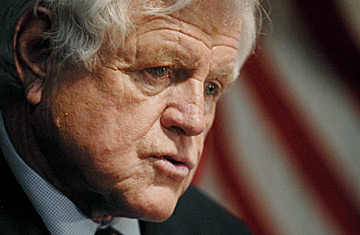
Senator Edward Kennedy
It's too early to know why Sen. Edward Kennedy of Massachusetts suffered an apparent seizure on Saturday while at his Cape Cod home. But his doctors now say that the cause was likely not a stroke.
Early tests performed on the 76-year-old Senator, who was brought by MedFlight helicopter to Massachusetts General Hospital in Boston, do not appear to show the neurological signs of stroke. By the end of the day, his doctors reported that he was resting comfortably and watching a Red Sox game on television.
Over the next few days, his doctors will perform a series of tests to determine what caused the seizure. One likely reason could be his heart; last October, Kennedy underwent surgery to clear blockages in his left carotid artery, one of two major blood vessels in the neck that shunt blood from the heart to the brain. Plaque buildup in these vessels, says Dr. Roger Blumenthal, director of preventive cardiology at Johns Hopkins Hospital — who has not treated the Senator — generally means that the heart vessels may contain considerable plaque as well. If pieces of these plaques break off and obstruct blood flow to the brain, a seizure could occur.
For any person of Kennedy's age who suffers a seizure, says Blumenthal, "we can't rule out anything cardiovascular or cerebrovascular." That means that tests of the electrical activity of Kennedy's heart will be useful in isolating any potential abnormalities in his heart function, such as a slow heart rate or an irregular heartbeat, that could have contributed to the seizure. CAT scans and MRIs of the brain will also be needed to ensure that Kennedy's episode wasn't caused by a tumor or infection in the brain.
If these tests are negative, Blumenthal says, then the explanation could be relatively straightforward. "Someone who has a simple faint, if it's hot, or hasn't eaten, could have a period of low blood pressure that after they collapse could look like a neurological event." Even a reaction to medications could cause such a brief blackout. "It's just too early to say," he notes.
